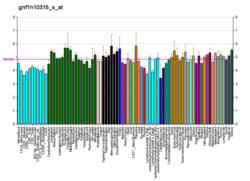From Wikipedia, the free encyclopedia
Prokineticin receptor 2 (PKR2 ), is a G protein-coupled receptor encoded by the PROKR2 gene in humans.[5]
Function Prokineticins are secreted proteins that can promote angiogenesis and induce strong gastrointestinal smooth muscle contraction. The protein encoded by this gene is an integral membrane protein and G protein-coupled receptor for prokineticins. The encoded protein is similar in sequence to GPR73, another G protein-coupled receptor for prokineticins.[5]
Mutations in the PROKR2 (also known as KAL3 ) gene have been implicated in hypogonadotropic hypogonadism and gynecomastia .[6]
See also References
Further reading
Lin DC, Bullock CM, Ehlert FJ, Chen JL, Tian H, Zhou QY (May 2002). "Identification and molecular characterization of two closely related G protein-coupled receptors activated by prokineticins/endocrine gland vascular endothelial growth factor" (PDF) . The Journal of Biological Chemistry . 277 (22): 19276–80. doi :10.1074/jbc.M202139200 . PMID 11886876 . S2CID 22935718 . {{cite journal }}: CS1 maint: unflagged free DOI (link )Soga T, Matsumoto Si, Oda T, Saito T, Hiyama H, Takasaki J, Kamohara M, Ohishi T, Matsushime H, Furuichi K (December 2002). "Molecular cloning and characterization of prokineticin receptors". Biochimica et Biophysica Acta (BBA) - Gene Structure and Expression . 1579 (2–3): 173–9. doi :10.1016/S0167-4781(02)00546-8 . PMID 12427552 . Battersby S, Critchley HO, Morgan K, Millar RP, Jabbour HN (May 2004). "Expression and regulation of the prokineticins (endocrine gland-derived vascular endothelial growth factor and Bv8) and their receptors in the human endometrium across the menstrual cycle" . The Journal of Clinical Endocrinology and Metabolism . 89 (5): 2463–9. doi :10.1210/jc.2003-032012 PMID 15126578 . Pasquali D, Rossi V, Staibano S, De Rosa G, Chieffi P, Prezioso D, Mirone V, Mascolo M, Tramontano D, Bellastella A, Sinisi AA (September 2006). "The endocrine-gland-derived vascular endothelial growth factor (EG-VEGF)/prokineticin 1 and 2 and receptor expression in human prostate: Up-regulation of EG-VEGF/prokineticin 1 with malignancy" . Endocrinology . 147 (9): 4245–51. doi :10.1210/en.2006-0614 PMID 16763065 . Dodé C, Teixeira L, Levilliers J, Fouveaut C, Bouchard P, Kottler ML, Lespinasse J, Lienhardt-Roussie A, Mathieu M, Moerman A, Morgan G, Murat A, Toublanc JE, Wolczynski S, Delpech M, Petit C, Young J, Hardelin JP (October 2006). "Kallmann syndrome: mutations in the genes encoding prokineticin-2 and prokineticin receptor-2" . PLOS Genetics . 2 (10): e175. doi :10.1371/journal.pgen.0020175 . PMC 1617130 PMID 17054399 . {{cite journal }}: CS1 maint: unflagged free DOI (link )
External links This article incorporates text from the United States National Library of Medicine , which is in the public domain .





